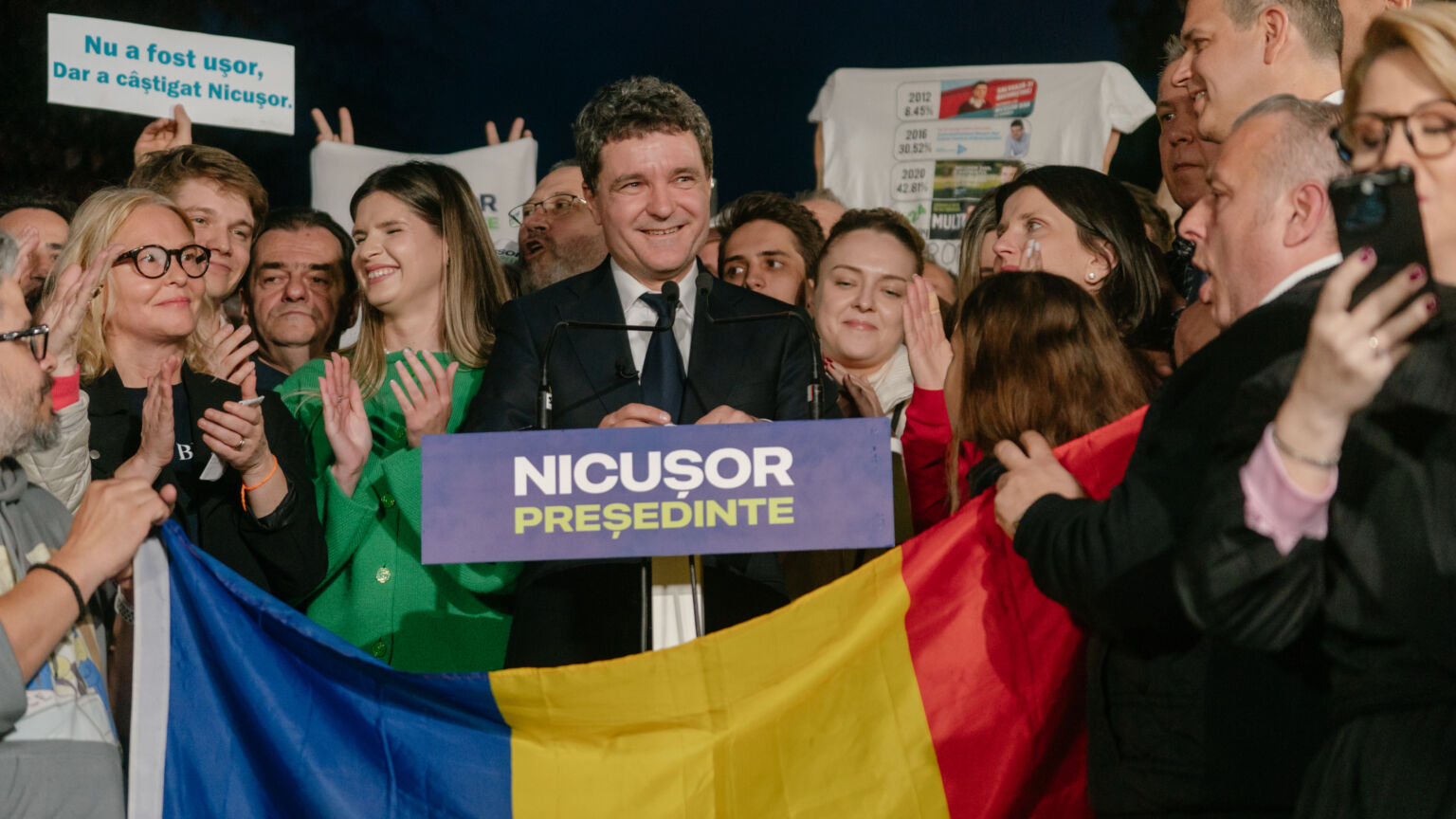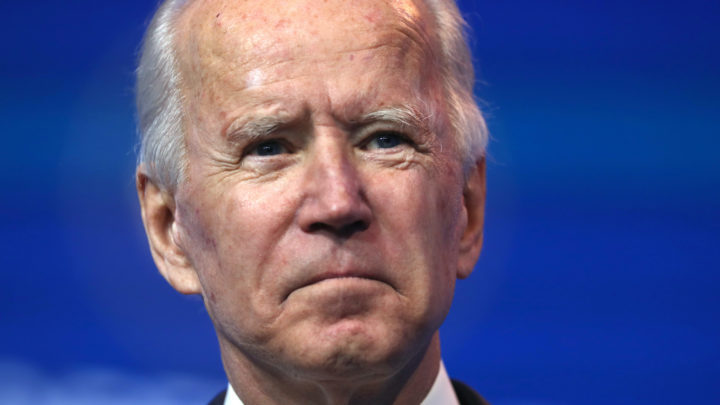Romania’s elections were a travesty of democracy
The pro-EU candidate won, but only after the first election was cancelled – and its victor was banned.

Want to read spiked ad-free? Become a spiked supporter.
As the result of Romania’s presidential election became clear on Monday morning, you could almost see the big, cheese-eating grins spreading across the faces of the EU’s governing classes. Their man had won. Picking up 54 per cent of the vote, the pro-EU, pro-NATO mayor of Bucharest, Nicuşor Dan, had beaten the Eurosceptic, right-wing nationalist, George Simion, into second place, on 46 per cent of the vote.
Members of the EU’s ruling caste have been revelling in Dan’s victory ever since. They’ve celebrated it as an endorsement of ‘the European project’ and a vindication of Brussels’ rule. Ursula von der Leyen, the European Commission’s president, said that voters had ‘chosen the promise of an open, prosperous Romania in a strong Europe’. French president Emmanuel Macron laid it on equally thick, claiming that Romanians had ‘chosen democracy, the rule of law and the European Union’.
As the EU’s bigwigs see it, Romanians voted the ‘right’ way, for the ‘right’ candidate. But their crowing obscures an awkward truth. Romanians were only able to vote as they did in this election because the Romanian state put its thumb on the scales – after they had voted the ‘wrong’ way last November.
That was when the first round of the presidential election originally took place. But in the first round of voting, right-wing nationalist outsider Calin Georgescu came from nowhere to beat the candidates of Romania’s once dominant centrist parties, the Social Democratic Party and the centre-right National Liberal Party. This would have set up a final run-off against another outsider, former TV journalist Elena Lasconi. The Romanian state decided this wasn’t going to happen.
Romanian intelligence services immediately leapt into action and, within weeks, published a dossier purporting to show Russian attempts to sway the elections. The Romanian Supreme Court then took the unprecedented steps of annulling the first-round results, cancelling the second round and then ordering a rerun of the presidential elections for this spring. Yet with Georgescu set to run again and, according to polls, win again, Romania’s election bureau made its move in March and prohibited his participation in further elections.
Georgescu is, by all accounts, a hard-right oddball. He’s a vaccine-sceptical, Putin-supporting ultra-nationalist. He was actually chucked out of Simion’s own Alliance for the Union of Romanians party in 2022, for half-praising the Iron Guard, a Romanian fascist militia from the 1930s and 1940s.
Still, you don’t have to approve of his views to recognise that his ousting from the elections was an outrage against democracy. Moscow may well have tried to influence last year’s election through social-media propaganda. Yet it wasn’t TikToks or Facebook posts that drove millions of voters Georgescu’s way. It was their disillusionment with the failed elite consensus of Romania’s establishment parties – on everything from Net Zero to the war in Ukraine. Amid a deep cost-of-living crisis, with Romania having the highest inflation and poverty rate in the EU, voters wanted something, and someone, different. And the Romanian state conspired to deny them their democratically expressed will. As Lasconi, Georgescu’s rival in the cancelled presidential run-off, put it: ‘The Romanian state trampled over democracy.’
And how did EU leaders and officials respond to the Romanian state’s anti-democratic machinations? Did they speak up to condemn them? Did they hell. They looked the other way – or worse, they endorsed the legal maneuverings as a tactic to be used against other insurgent populist politicians and parties in Europe.
This month’s presidential election has been shaped by the aftershocks of what happened last year. Bucharest mayor Nicuşor Dan, a centrist independent candidate, ran explicitly as the establishment, pro-EU choice. At the same time, he and his supporters successfully cast his rival Simion as the pro-Russian candidate, a task made easier by Simion’s opposition to helping Ukraine’s war effort. So successful was the effort to present him as the Kremlin’s pick that he felt the need earlier this month to explicitly present himself as a pro-NATO, pro-EU right-winger in the manner of Italy’s prime minister, Giorgia Meloni.
It was to no avail. As Christian Preda, a politics professor at the University of Bucharest, put it: ‘Voters were faced with a choice between the positions of the Kremlin, and those of Brussels.’ In other words, vote the ‘right’ way or else you’ll end up under the thumb of Moscow. Understandably, a majority of Romanians didn’t fancy that as an alternative to the status quo.
Given the raised stakes, it’s no surprise that electoral turnout was up to 65 per cent – a 25-year high. More notable still, the number of votes from Romanians abroad reached record levels, at somewhere close to two million. It’s likely that a higher than usual proportion of those votes, from people living and working elsewhere in the EU, will have been for Dan, the pro-EU candidate.
There’s no doubting the legitimacy of this weekend’s vote, even if Simion initially tried to, before backing down. Yet a lingering sense of injustice hangs over it nonetheless. Romanians expressed their democratic will six months ago. And because it was not to the liking of Romania’s governing elites and their EU backers, their will was denied. They were told to vote again in an election that looked and felt very different to the one scheduled for last year.
EU leaders may try to claim that Romanians have ‘chosen’ the EU. That they’ve finally voted the ‘right’ way. But at what cost to democracy?
Tim Black is associate editor of spiked.
Who funds spiked? You do
We are funded by you. And in this era of cancel culture and advertiser boycotts, we rely on your donations more than ever. Seventy per cent of our revenue comes from our readers’ donations – the vast majority giving just £5 per month. If you make a regular donation – of £5 a month or £50 a year – you can become a and enjoy:
–Ad-free reading
–Exclusive events
–Access to our comments section
It’s the best way to keep spiked going – and growing. Thank you!








Comments
Want to join the conversation?
Only spiked supporters and patrons, who donate regularly to us, can comment on our articles.